Let me begin with our two biggest neighbours -- Pakistan and China. We do have several concerns vis-a-vis Pakistan and the situation is proving more difficult than anticipated. During the years 2003-2006, India had initiated a series of dialogues with Pakistan under various labels - the most widely discussed being the 'Comprehensive Dialogue' between the foreign offices of the two countries, which had several subtexts.
During the Musharraf years, there was also a fairly active back-channel. Problems within Pakistan, after 2006-2007, put a crimp on the back-channel discussions, but the Comprehensive Dialogue continued till the coordinated terrorist attack on multiple targets in Mumbai on November 26, 2008.
Text: M K Narayanan
Real power in Pakistan vests with the military
Image: Prime Minister Manmohan Singh with Pakistan PM Yusuf Raza GilaniAn indication of Pakistan's determination to employ terror as a weapon and destabilise India led to a break in talks. Beginnings of a thaw first occurred at Sharm al-Sheikh in July 2009, when the prime ministers of the two countries hinted at a possible resumption of talks.
This was followed by the meeting between the two leaders at Thimpu in April 2010. Tentative efforts at resumption of talks leading to meetings at the level of the two Foreign Ministers, the two Home Ministers and the two foreign secretaries, has, however, not resulted in any forward movement.
But real power in Pakistan vests with the military and intelligence services, which are intrinsically hostile to India and, till a change occurs, there is little scope for optimism.
A building-block approach
As for China, strengthening our engagement is an important plank of our foreign policy and has been so for some years now. The perception is that it is in the interest of both countries to strengthen their engagement. Towards this end, the two countries have adopted a building-block approach since the late 1980s.
In 2005, India and China announced the establishment of a 'Strategic and Cooperative Partnership for Peace and Prosperity'. This was during the visit of Premier Wen Jiabao to India that year. In 2007, during the visit of President Hu Jintao to Delhi, a 10-point road map was drawn up to enhance the Strategic Partnership.
India. China's 'shared vision'
In January 2008, the prime ministers of India and China signed a landmark document, 'Shared Vision in the 21st Century' when Prime Minister Manmohan Singh visited Beijing, which contained important guidelines outlining the future course of relations between the two countries.
The determination to build a close relationship has been reiterated from time to time at each of the high level meetings held between the leaders of India and China. More recently, the two countries have acted in concert to meet global challenges.
China pursues its interests with single-minded determination
Notwithstanding increased levels of engagement, it is apparent that we need a very sophisticated approach to deal with the strategic challenge posed by China, which has been known to pursue its interests with single-minded determination. More recently, it is seen to have become increasingly assertive as well.
Moreover, as the second-largest economy in the world, China is beginning to cast a much longer shadow than previously, in many areas. We have a border dispute with China covering a few thousand miles. Negotiations have been going on for many years, but no tangible results have yet resulted.
We will need to be careful
Since 2003, a 'Special Representative' mechanism has been in place and, so far, 12 rounds of discussions have been held. To maintain peace and tranquility on the border, one major step taken was the signing of the agreement on 'Political Parameters and Guiding Principles for the Settlement of the Border Dispute'. This is the only agreement specifically dealing with the border dispute to be signed between the two sides.
While both sides have agreed to maintain peace and tranquility on the border, we will need to be careful. In the past, China has displayed a readiness to take risks that most nations normally avoid. It perceives itself as the dominant military power in Asia and has systematically modernised and streamlined its missile, nuclear, air and naval capabilities.
Therefore, it has become important to achieve a more mature understanding of China's intentions vis-a-vis India -- since its capability is now well evident. This alone can ensure a realistic appreciation of where India and China stand today.
Excerpts from the Fourth T A Pai Management Institute Silver Jubilee Leadership Lecture by West Bengal Governor M K Narayanan 'India's Engagement with the World' in Manipal on September 7

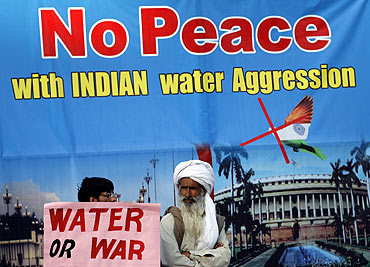
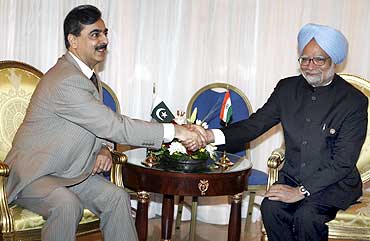

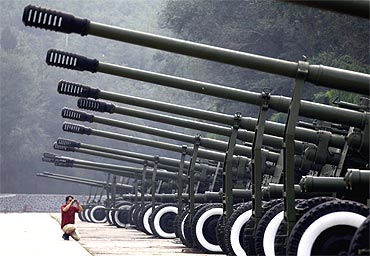
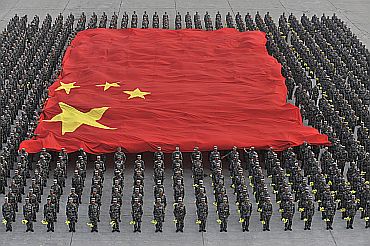
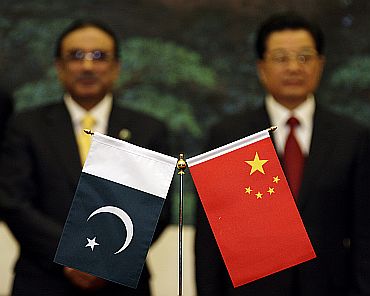
article